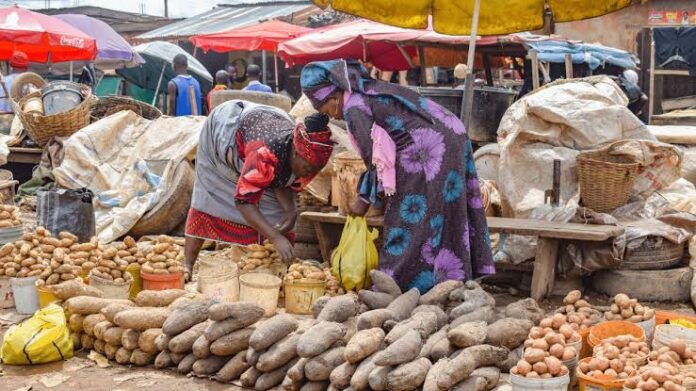By Teddy Nwanunobi
Alliance for Green Revolution in Africa, AGRA, has revealed that the number of people with lack of adequate food for consumption in West African countries rose to 162.7 million in the month of July.
AljazirahNigeria reports that AGRA is an African-led African-based organisation that seeks to catalyse agriculture transformation in Africa.
According to the report, the figure is an increase of 4.3 million people from June.
Its monthly Food Security Monitor stated that Ghana and Nigeria recorded an increase of 5.77 and 3.98% respectively.
According to it, the prevalence of insufficient food consumption in July this year also remains above that of July last year (125.7 million people) and July 2022 (107.9 million people).
In terms of changes in individual countries compared to the past year, all monitored countries in West Africa, it revealed, have experienced surges, with Cote d’Ivoire and Nigeria having the most surges at 41.67 and 39.01% respectively.
Nigeria’s national average price of maize in Dollars, it continued to show a decline over the past month, being lower at $411/metric tonne (Mt), compared to Togo’s $470/Mt, largely contributed to ongoing currency weakening.
However, the overall local prices of maize grain in the two countries show higher trends compared to the past 3 to 12 months, except for a few markets in Togo whose current price is stable or declined compared to the past 12 months.
The price of maize, particularly in Kara, is 19.12% lower than a year ago.
According to the monitor, conflict, insecurity and political tension in West Africa continue to disrupt agriculture, trade and food assistance activities, resulting in higher food prices, while poor macroeconomic conditions, driven by high Inflation rates, local currency depreciations and elevated fuel prices are pushing food prices upwards in some countries.
In addition, the monitor observed that seasonal changes in food supply, including the early onset of the lean season in most countries in West Africa, are putting upward pressure on food prices.
Overall, the prices of monitored fertiliser types across the selected West African countries, the monitor, continued, showed low to high price decrease when compared to the past 1-12 months, apart from NPK15 and NPK20 in Nigeria being 30.96% and 16.44% higher respectively compared to the past three months.
The current prices are significantly lower, ranging from 4.76% to 49.51%, than they were 6-12 months ago.
The higher price of NPK in Nigeria, it pointed out, can be attributed to heightened costs of raw materials, increased ex-factory prices, as well as the high cost of fuel (diesel) that leads to elevated transportation costs.





